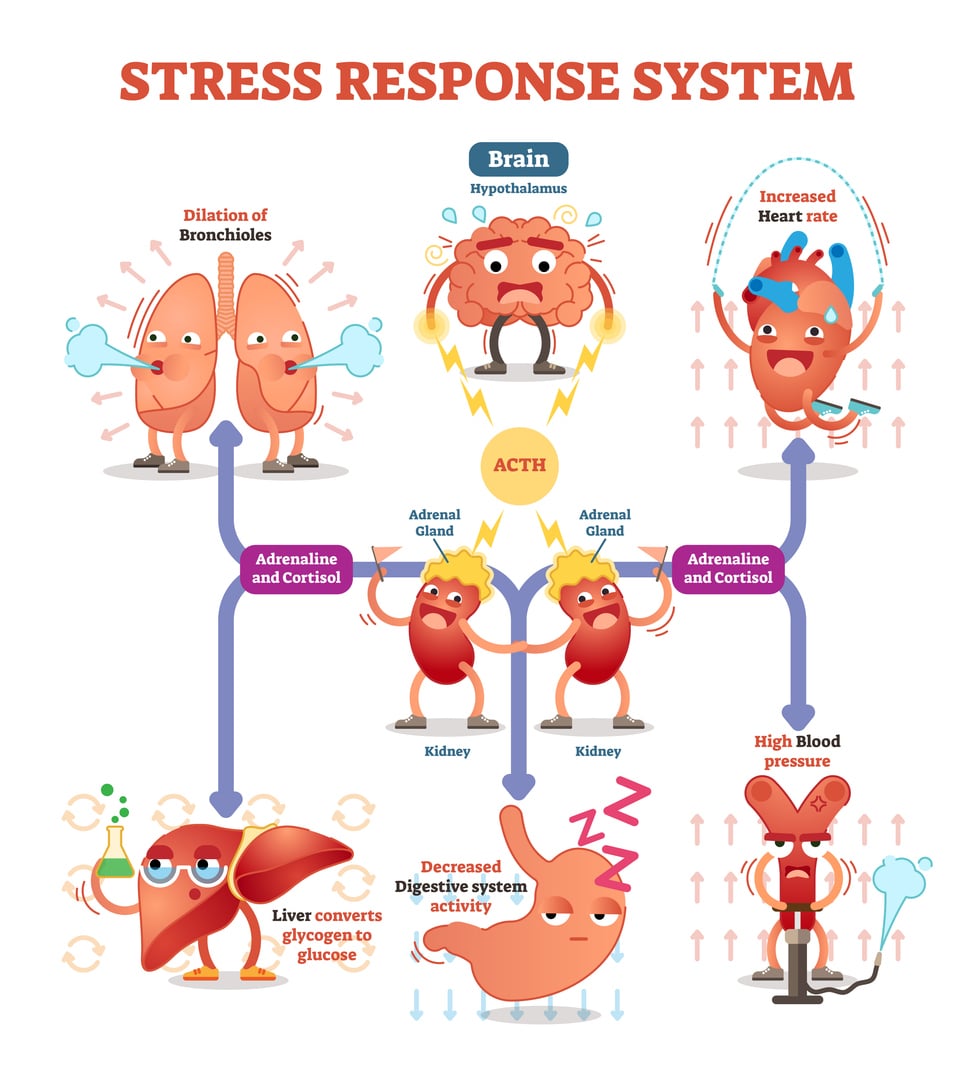
How Stress Affects Your Digestion and Ways to Manage It
Stress is more than just a mental burden—it can also harm your digestive system. When you’re stressed, your body responds in ways that can interfere with digestion, causing discomfort and worsening conditions like acid reflux, IBS, and ulcers. Symptoms such as bloating, cramping, and changes in appetite may arise, making everyday life challenging. But understanding how stress impacts your digestive health is the first step in managing both your mind and body more effectively.

How Stress Affects the Digestive System
Stress triggers the fight-or-flight response, releasing hormones like cortisol and adrenaline that can disrupt normal digestion. These changes in your body can lead to a variety of symptoms and make pre-existing digestive conditions worse. Here’s how stress can affect your digestive system:
Symptoms of Stress on Digestion:
- Bloating & Cramping: Stress can slow down digestion, causing discomfort, swelling, or pain in the stomach area.
- Constipation & Diarrhea: Stress can either speed up or slow down bowel movements, leading to constipation or frequent, loose stools.
- Indigestion: Stress may cause stomach discomfort, heartburn, or nausea after eating.
- Changes in Appetite: Stress can trigger overeating or loss of appetite, disrupting your usual eating habits.
- Nausea: Stress can contribute to nausea, especially when combined with other digestive problems.
Conditions Worsened by Stress:
- Irritable Bowel Syndrome (IBS): Stress can trigger IBS flare-ups, leading to bloating, diarrhea, and abdominal pain.
- Acid Reflux (GERD): Stress can cause the lower esophageal sphincter to relax, allowing stomach acid to move into the esophagus, causing heartburn.
- Ulcers: Chronic stress can increase stomach acid production, which can contribute to the development of ulcers.
- Inflammatory Bowel Disease (IBD): Stress may worsen inflammation in conditions like Crohn’s disease and ulcerative colitis.
- Gut Microbiota Imbalance: Stress can alter the composition of gut bacteria, affecting digestion and overall gut health.
The Connection Between Stress and the Immune System
Stress harms more than just the digestive system. It can weaken your immune system, too. A healthy immune system is crucial for fighting illness. When you’re under stress, your body releases cortisol and other hormones that suppress your immune function over time. This can make your body more vulnerable to infections, including those in the gut. A weakened immune system can also impair your body’s ability to repair damaged tissues and maintain a balanced gut microbiome. By managing stress effectively, you can strengthen your immune system, helping your body protect itself and improve your digestive health.
Long-Term Effects of Stress on Digestion
Chronic stress can have lasting impacts on your digestive system. Over time, the constant activation of the body’s fight-or-flight response can interfere with the normal functioning of your digestive tract. Stress hormones like cortisol can increase stomach acid, slow digestion, and reduce blood flow to your digestive organs. This can worsen chronic digestive issues like IBS, reflux, and ulcers. Additionally, long-term stress can weaken the immune system, making you more prone to infections and inflammation in the gut. If not managed, chronic stress can lead to ongoing discomfort and long-term digestive problems.

10 Ways to Manage Stress and Improve Digestive Health
Managing stress is essential for maintaining both mental and digestive health. By incorporating effective strategies into your daily routine, you can help reduce stress’s negative impact on your digestive system. Consider these tips:
- Practice Mindfulness and Meditation: Regular mindfulness practices, such as meditation, deep breathing exercises, or yoga, can help calm your mind and reduce stress. These practices can lower cortisol levels and promote relaxation, which benefits digestion.
- Exercise Regularly: Physical activity is a great way to release built-up stress. Exercise increases endorphins, natural mood boosters, and can improve gut motility, reducing symptoms like bloating or constipation.
- Get Enough Sleep: Sleep is essential for both mental and physical health. Stress can interfere with sleep, but good quality sleep helps regulate stress hormones and supports digestion. Aim for 7-9 hours of sleep each night.
- Eat a Balanced Diet: A diet rich in fiber, fruits, vegetables, and lean proteins can support digestive health and help counteract the adverse effects of stress. Avoid overeating or turning to unhealthy comfort foods, as they can worsen digestive issues.
- Stay Hydrated: Drinking plenty of water is essential for digestion, especially when stress can lead to dehydration. Staying hydrated can prevent constipation and keep your digestive system functioning smoothly.
- Limit Stimulants: Caffeine, alcohol, and nicotine can exacerbate stress and digestive issues. Consider reducing your intake of these substances to help keep both stress and digestive problems in check.
- Set Boundaries and Prioritize Self-Care: Stress often arises from feeling overwhelmed. Setting clear boundaries, saying no when necessary, and making time for self-care can help reduce stress and its effects on your body.
- Seek Professional Help: If stress significantly affects your digestive health, consider seeking help from a healthcare professional. Therapy, counseling, or working with a nutritionist can provide additional support for managing stress and improving your digestive health.
- Engage in Relaxing Hobbies: Activities such as reading, gardening, painting, or listening to music can offer a mental escape and reduce the physical impacts of stress on your digestive system.
- Connect with Others: Social support is vital for managing stress. Spending time with friends and family or talking to a trusted individual can help reduce feelings of isolation and stress, improving overall well-being.

Boost Your Gut Health with Stress Management
Managing stress is vital for both your mind and your digestive system. By adopting stress-reducing habits and making simple lifestyle changes, you can help restore balance and improve your digestive function. Whether it’s practicing mindfulness, getting enough sleep, or nourishing your body with a healthy diet, these small changes can have a powerful impact on how you feel both physically and mentally.
If you’re finding it difficult to manage stress or if digestive symptoms are affecting your daily life, don’t hesitate to reach out to the experts at Gastro MD. We’re committed to providing personalized care and practical solutions to help you navigate your digestive health. Reach out today to learn how we can support you on your journey to better health.



